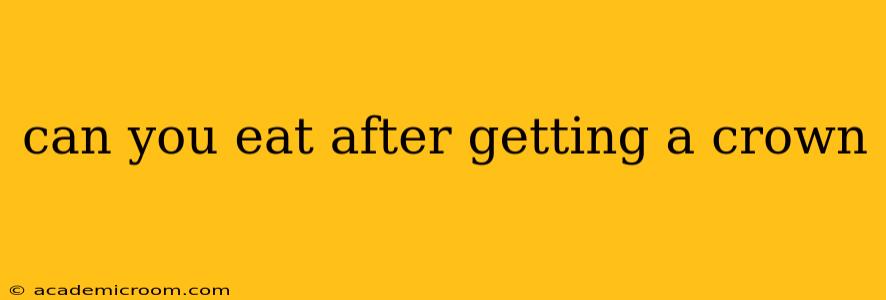Getting a dental crown is a significant step in restoring your oral health. But once the procedure is complete, a common question arises: can you eat after getting a crown? The answer is yes, but with important caveats. The immediate aftermath requires careful consideration to ensure the crown's longevity and prevent potential complications. This guide will address that and answer other frequently asked questions.
What Can I Eat After Getting a Crown?
Immediately after getting a crown cemented, you'll likely experience some numbness from the local anesthetic. During this time, it's best to avoid eating altogether until the numbness wears off to prevent accidental biting or chewing damage. Once the numbness subsides (typically within a few hours), you can gradually reintroduce food into your diet, starting with soft foods.
Good choices include:
- Soft foods: Yogurt, applesauce, mashed potatoes, oatmeal, scrambled eggs, and well-cooked pasta. These are gentle on the newly placed crown and your gums.
- Pureed foods: Smooth soups and blended vegetables can ease you back into eating without putting undue stress on the crown.
Avoid these until the crown is fully settled:
- Hard, crunchy foods: Nuts, hard candies, ice, popcorn, and raw vegetables can damage or dislodge the crown.
- Sticky foods: Caramel, taffy, gum, and other sticky treats can pull on the crown and compromise its seal.
- Tough, chewy foods: Steak, jerky, and other foods requiring significant chewing force should be avoided initially.
Gradually, as your mouth adjusts, you can reintroduce more solid foods into your diet.
How Long Should I Wait Before Eating After Getting a Crown?
It's recommended to wait at least a few hours after the procedure before eating anything substantial. This allows the anesthetic to wear off completely and the cement to begin setting. While soft foods are okay after a few hours, it's prudent to maintain a soft food diet for at least 24 hours, gradually adding firmer foods in the following days.
What Happens if I Bite Down Too Hard on My New Crown?
Biting down too hard, especially on hard or sticky foods, immediately after getting a crown can lead to several problems:
- Crown dislodgement: The crown might become loose or even fall out completely.
- Crown fracture: The crown itself could crack or chip.
- Cement failure: The cement bonding the crown to the tooth may fail, leading to leakage and potential decay.
- Gum irritation: Excessive biting force can irritate the gums surrounding the crown.
If you suspect you've bitten down too hard or experience any discomfort or problems with your crown, contact your dentist immediately.
Can I Eat Normal Food After a Week?
After approximately a week, you should be able to resume your normal diet, provided the crown feels secure and comfortable. However, it's still wise to be mindful of exceptionally hard, sticky, or chewy foods to ensure the longevity of your crown. Think of it as a long-term investment in your dental health; careful eating habits will help protect that investment.
What if My Crown Feels Loose?
A loose-feeling crown is a serious issue. Do not attempt to adjust it yourself. Contact your dentist immediately. A loose crown can lead to further complications, including tooth damage and potential infection.
In Conclusion: Patience and Care are Key
Remember, patience and careful eating habits are crucial after getting a dental crown. By following these guidelines and being mindful of what you eat, you can significantly increase the lifespan of your new crown and enjoy a healthy smile for years to come. Remember to always consult your dentist if you have any concerns or experience any issues with your new crown.
